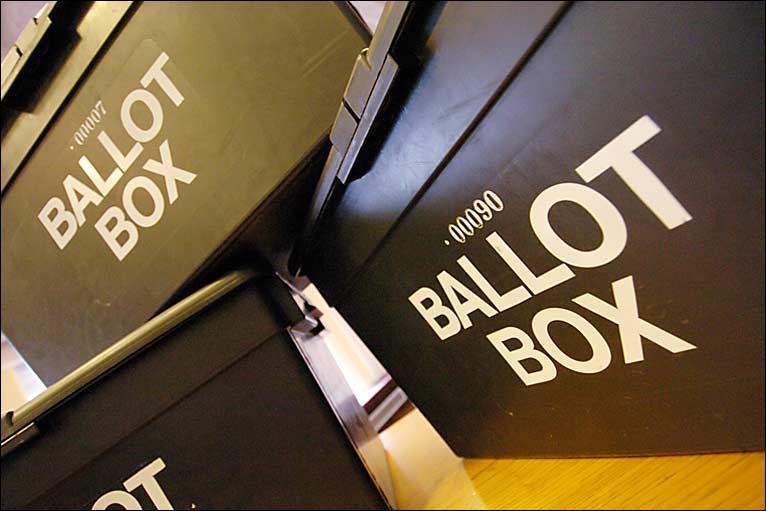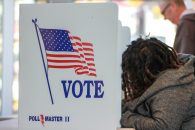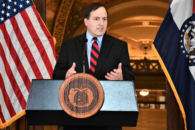JEFFERSON CITY, Mo. – Secretary of State Jason Kander faces an unprecedented decision after the Supreme Court refused to hear an appeal of a judge’s decision to rewrite the Early Childhood Health and Education Amendment.
For the first time in Missouri history, a secretary of state must decide whether to certify signatures for an initiative petition that has had its title and summary changed by the court. It’s the latest turn in a long saga that’s been playing out with the most contentious ballot fight this year.
Wednesday’s decision by the Supreme Court, for which they offered no reasoning, represented the culmination of the first phase of a legal battle over the language in the initiative petition.
But a decision Thursday to deny a similar motion by a committee supporting the initiative petition could have opened the door for Kander to certify the signatures while following the law.
As soon as the petition turned in the required signatures, opponents of the ballot measure sought to derail its progress through the court system. In May, a Judge Daniel Green vacated the petition’s fiscal note, ruling it unfair and insufficient. However, he ruled the summary statement fair and sufficient.
That changed this month when Judge Alok Ahuja signed a judgement by an appeals court ruling the opposite. They deemed the fiscal note fair and sufficient, but the summary unfair and insufficient.
Both the petition’s supporters and Kander tried to get either a rehearing or a transfer to the state Supreme Court, but their efforts were exhausted Wednesday.
Kander faces an unprecedented choice, but the arguments in the office’s filing to rehear the appeals court decision may offer some clues.
“The proposed constitutional amendment is now in jeopardy because a panel of this Court held that the summary statement, which was circulated and signatures have been collected and submitted, is unfair and insufficient,” the brief said, hinting that Kander may be forced to not certify the signatures.
Groups opposing the amendment say that Kander’s decision is no longer much of a choice.
“Because of the courts’ rulings, that deceptive language is no longer the official ballot summary,” said Ron Leone, executive director, Missouri Petroleum Marketers and Convenience Store Association. “Missouri law is clear: the Secretary of State cannot allow petitions that do not include an official ballot summary. As a result, the Secretary of State must strike Big Tobacco’s initiative from the ballot.”
However, a second decision Thursday could open the door for the petition. The Missouri Supreme Court rejected the request by Raise Your Hand for Kids, the committee that collected signatures for the initiative petition, to transfer their appeal to the highest court in the state.
Jane Dueker, who was recently retained by the committee, said that decision could have actually thrown out all of the rulings in the case. That’s because according to Missouri statute, pending court battles regarding initiative petitions must be resolved by the 180th day since signatures were turned in. This year, that deadline was Wednesday.
“You don’t have a final adjudication until the Supreme Court denies all applications for transfer,” Dueker said. “Because you are not allowed to enforce a non-final order, there is no order out there for them to enforce anymore. Which means it’s as if the litigation never took place.”
No matter what Kander chooses, litigation is likely to continue.
Millions of dollars have been poured into the effort to pass the amendment and those groups aren’t expected to allow the invalidation of more than 300,000 signatures to just happen. On the other hand, if Kander decides to certify the signatures multiple groups could sue.
“There are going to be legal battles either way,” said Chuck Hatfield, an attorney for the man who filed the case against the petition. “I am 90 plus percent sure that there’s going to be more litigation on this.
For groups supporting the Early Childhood Health and Education Amendment, their issues don’t stop if the measure gets final approval for the November ballot. A lot of significant groups, considered natural allies, have expressed opposition to the amendment. They include the Missouri National Educators Association, the Missouri Retired Teachers Association and the Missouri Rural Education Association.
The way the petition is written, funds raised by raising tobacco taxes could go to both public and private schools. That’s drawn the opposition of the education groups. Health groups, including the American Cancer Society, have also opposed the petition over concerns for how it would affect research in the state and fears it would undermine public health.
That leaves the campaign in support of the ballot measure, supported by Raise Your Hand for Kids and the Early Childhood Education Initiative, facing an uphill battle.
They recently reorganized some of their campaign organization. Raise Your Hand for Kids replaced Linda Rallo as its executive director for the “final phase” of their campaign.
It also seems as though the Early Childhood Education Initiative will take the lead in campaigning down the stretch, with recently hired consultant Jack Cardetti. The committee announced last month that they would spend more than $5 million down the stretch.
Raise Your Hand for Kids is also using the legal battle to fight their campaign, telling supporters in an email Thursday, “Our opponents want to disenfranchise voters, and that will not happen on our watch.”
They also continue to tout the support of groups like NAACP, Parents as Teachers, the Missouri School Boards’ Association.

















